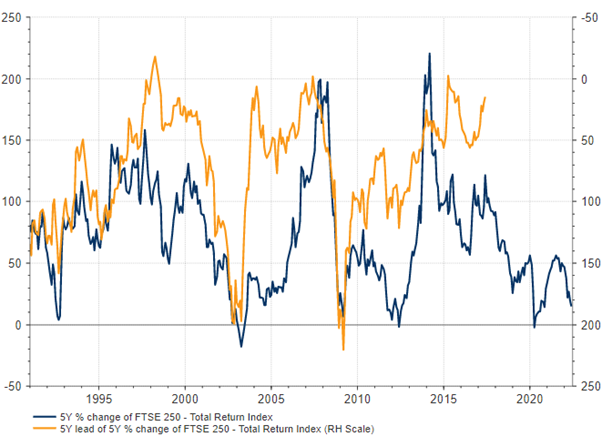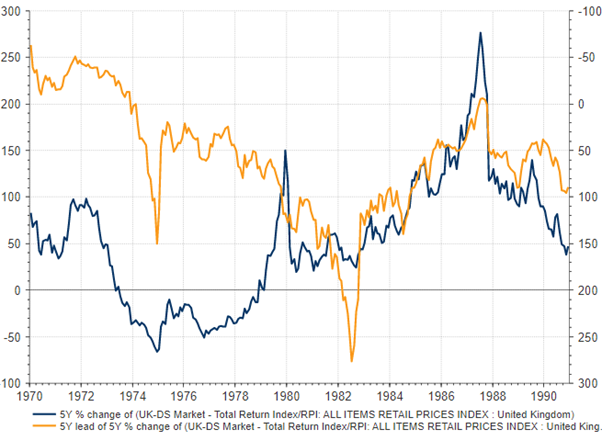
Source: Refinitiv Eikon
In the book of Genesis the Pharaoh of Egypt was warned by Joseph that he would enjoy seven fat years of good harvests to be followed by seven lean years. Investing’s ups and downs show similarities to the varying floods of the river Nile. In our chart we show (in dark blue) the total return for UK mid-caps over five year periods. Only in the period from early 1998 to early 2003 was the index negative. On three other times it flirted with negative territory only very briefly.
When was the smart time to invest? Here we look to the orange line. This is the same five year total return but this time it’s lagged by five years and inverted on the right hand axis. It tells us what return was enjoyed over the following five years. The person investing in at the low in early 2003 would go on to make a nearly 200% total return.
And in case you suspect we have chosen a particularly favourable period for our chart, here is a similar one covering all UK stocks from 1970 to 1990. With this chart we also deflated share prices to reflect the change in the retail prices index. (This understates the true five year returns by about 4% but, hey, that’s statistics.) Notice that at every point where the five year return was negative, even on this harsh RPI basis, it made sense to be buying rather than selling. The time to increase investments is after the bad times.

Source: Refinitiv Eikon
The lesson is simple but of course a hard one to follow in practice: the best time to buy is when everything looks the most grim. Many people buy near the top and sell near the bottom. This just magnifies the returns for more level-headed investors with a medium-term perspective.
But why don’t the bad times just get even worse? It’s because capital continues to quietly compound its returns each year. The capital in a business at year end is more than at the start of the year and, like a decent deposit account, it generally makes a bit more return each year from that larger capital. This is isn’t just arithmetic. Knowledge also accumulates and the world gets smarter. Robot vacuum cleaners, robot taxis, robot warehouses: in investment terms they mean more money for people to spend – and invest – on better things.
Risk Warning: Past performance is not necessarily a guide to the future. The value of investments and the income from them may go down as well as up. Investors may not receive back their original investment. The Funds have a concentrated portfolio which means greater exposure to a smaller number of securities than a more diversified portfolio. Charges are not made uniformly throughout the period of the investment. The Funds invest in smaller companies and carries a higher degree of risk than funds investing in larger companies. The shares of smaller companies may be less liquid and their performance more volatile over shorter time periods. The Funds can also invest in smaller companies listed on the Alternative Investment Market (AIM) which also carry the risks described above. The Funds may invest in derivatives and forward transactions for the reduction of risk or costs, or the generation of additional capital or income with an acceptably low level of risk which is unlikely to increase the risk profile of the Funds significantly. This email is provided for information purposes only and should not be interpreted as investment advice. If you have any doubts as to the suitability of an investment, please consult your financial adviser.
The latest Key Investor Information Documents and Prospectus is available free of charge from Slater Investments Ltd and on their website. You are required to read the Key Investor Information Document of the Fund and the Supplementary Information Document before making an investment. Telephone calls may be recorded. Slater Investments Ltd, which is authorised and regulated by the Financial Conduct Authority, is the manager of the Slater Income Fund. Slater Investments Ltd address is Nicholas House, 3 Laurence Pountney Hill, London, EC4R 0EU.
Slater Investments does not offer investment advice or make any recommendations regarding the suitability of its products. No information contained within this website should be construed as advice. Should you feel you need advice, please contact a financial adviser. Past performance is not necessarily a guide to future performance. The value of investments and the income from them may fall as well as rise and be affected by changes in exchange rates, and you may not get back the amount of your original investment.
Regulatory: Slater Investments Limited is authorised and regulated by the Financial Conduct Authority Registration Number: 165999
